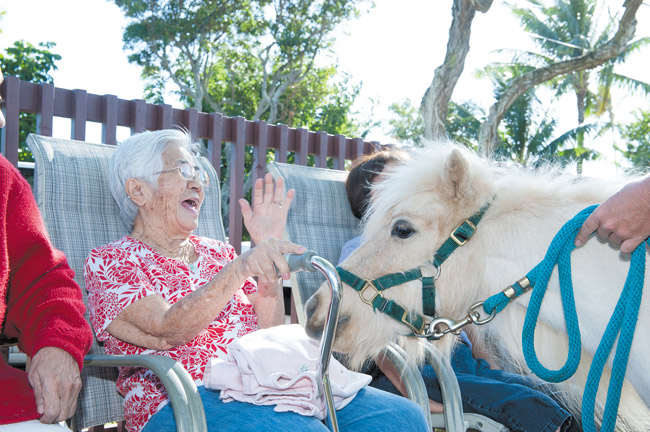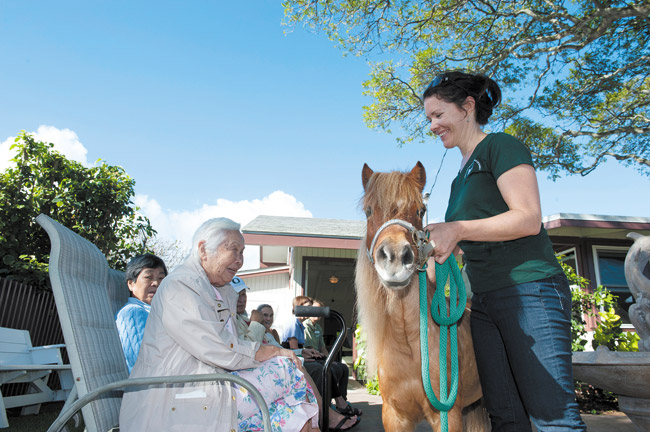Magical Minis
Miniature horses Makakoa and Kamalani bring comfort and smiles to those they visit, demonstrating the powerful effect horses have on humans
There’s something magical, almost phantasmal about seeing a miniature horse for the first time. You stare a little, laugh in bemusement, and it is hard to resist the urge to touch.
And for Makakoa, 11, and Kamalani, 9, that’s quite all right — it’s exactly the type of response they’re meant to draw from everyone they encounter.
The diminutive duo has begun to travel around the island, visiting anyone who will have them, as part of Therapeutic Horsemanship of Hawaii. While the nonprofit organization does offer classes at its Waimanalo headquarters, executive director Dana Vennen is well aware that some people simply cannot afford it or are not physically able to make the journey there. With these mobile-friendly minis, she hopes anyone interested will experience the joy of interacting with a horse.
“To be able to bring these horses to people, really, is the realization of a dream I’ve had for a long time,” says Vennen.
On the Right PATH
If you ask Vennen to recall the moment she knew her life would be devoted to horses, you won’t get a straight answer because, for someone who has been attracted to horses since as early as she can remember, it’s an unexplainable passion. She wasn’t always able to ride horses as much as she wanted, as she only occasionally took lessons as a child.
That has, in many ways, greatly influenced the mission of the organization.
“Any kid who’s born loving horses should be able to be around horses,” she says.
Certified by Professional Association of Therapeutic Horsemanship (PATH), Therapeutic Horsemanship of Hawaii is a premier accredited center — a distinction it has held for roughly seven years. Currently, the organization has 13 horses, including Makakoa and Kamalani, and welcomes about 100 riders weekly.
Vennen is an advanced-level therapeutic riding instructor. And while she may teach a variety of riding lessons, one in particular remains her favorite.
“My very, very favorite one is the first time someone rides a horse and it’s, like, magical,” she says.
Therapeutic Horsemanship of Hawaii works with just about anyone, from Wounded Warriors to foster kids and children suffering from emotional and cognitive disabilities, autism, ADD and cerebral palsy.
The goal, says Vennen, is simply to improve the minds and bodies of all who participate.
“The horses are the therapists, and the horses are really what makes it work,” she says.
Horses in Action
On this particular morning, Makakoa and Kamalani are visiting Windward Senior Day Care. It’s only their second time in such a setting, but with naturally outgoing dispositions, they are doing remarkably well — though much like siblings, they sometimes bicker and bite at one another, much to the amusement of everyone watching.
As they walk around the courtyard, faces brighten and the mood shifts to one of excitement. More than anything, and especially for those dealing with Alzheimer’s, this visit is more than just a way to pass time.
“It’ll bring out their cognitive skills, as far as them reaching out to stroke and just being able to touch,” says center executive director Kathleen K. Camara.
“Oftentimes, we have to learn how to ‘speak’ Alzheimer’s,” she adds, “and a lot of it is by silence and touching.”
It’s amazing to watch, as some seniors who previously had been sitting quietly begin to talk, laugh and pet the horses.
And it’s a perfect example of the profound effect horses can have on humans.
Children, for example, who otherwise are powerless to adults making decisions for them, are able to learn trust, confidence and a sense of accomplishment while riding a horse.
“They get up on that horse and the horse is listening to them,” says Vennen. “I think that’s the biggest power that we can give to a child.”
Perhaps more important, horses have the ability to physically heal riders. When you sit on the back of a horse and it begins walking, explains Vennen, it moves your body through normal walking motions. Those who have never experienced the sensation of walking are able to, and in cases of cerebral palsy, sitting on the back of a walking horse for 20 minutes has been shown to improve their own gait.
Or there are horses like Makakoa and Kamalani, who offer emotional support and comfort. Besides their time at Windward Senior Day Care, the miniature duo also has paid a visit to Kahuku Medical Center and have been called upon for educational purposes. During classroom visits, children are able to pet Makakoa and Kamalani, and learn about horses.
The reaction, she says, has been welcoming, and eventually, Vennen hopes to bring out Makakoa and Kamalani for visits a couple of times a week.
“I think we’re just getting started,” she says.
For more information on Therapeutic Horsemanship of Hawaii or to schedule a visit with Makakoa and Kamalani, visit thhwaimanalo.org.







